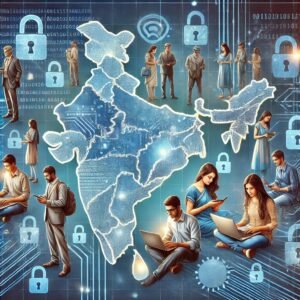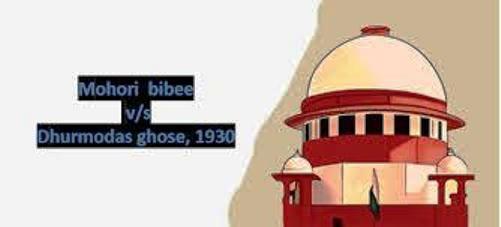Introduction to Cyber Law in India
Cyber Law in India : Cyber Law refers to the legal framework governing internet usage, electronic transactions, cybercrimes, and digital privacy. The Information Technology Act, 2000 (IT Act) is the primary legislation dealing with cyber offenses in India. It regulates:
- Cybercrimes (Hacking, Phishing, Identity Theft, Cyber Terrorism)
- Electronic Governance & Digital Signatures
- Data Protection & Privacy
- Liability of Intermediaries (Social Media, ISPs, Websites)
Cyber Law is crucially important for India because of the country’s rapidly expanding digital landscape, growing internet penetration, and increasing reliance on digital platforms across sectors like banking, governance, education, and commerce. Here’s a detailed breakdown of why Cyber Law in India is so important.

🔐 1. Protection Against Cybercrimes
-
India ranks among the top countries targeted by cybercriminals.
-
Cyber laws help tackle offenses like:
-
Hacking
-
Phishing
-
Identity theft
-
Cyberstalking
-
Financial frauds
-
-
With increasing digital payments and e-commerce, these laws protect individuals and businesses from massive financial and reputational loss.
💼 2. Safeguarding E-Commerce & Digital Economy
-
India’s digital economy is projected to reach $1 trillion by 2026.
-
Cyber Law in India ensures:
-
Secure digital transactions
-
Protection of consumer rights
-
Trust in online services
-
-
It encourages foreign investment and innovation by ensuring legal protection for digital businesses.
🏛️ 3. Enabling E-Governance and Digital India
-
Under initiatives like Digital India, the government is moving services online.
-
Cyber Law in India ensures:
-
Authenticity of digital documents (via Digital Signatures, E-contracts)
-
Legality of online communication
-
Protection of public data
-
-
It also supports the functioning of Aadhaar, e-filing of taxes, and e-courts.
🧒 4. Protection of Children & Women Online
-
Laws like Section 66E, 67, and 67B of the IT Act penalize:
-
Cyberbullying
-
Child pornography
-
Online harassment
-
-
Cyber law is vital to ensure a safe internet environment, especially with increasing internet usage by youth.
🛡️ 5. National Security
-
Cyber attacks can target:
-
Government infrastructure
-
Power grids
-
Banking systems
-
-
Cyber law helps detect, deter, and punish cyber terrorism and data breaches, essential for national security and stability.
📜 6. Legal Recognition to Digital Evidence
-
Courts now accept digital evidence like emails, CCTV footage, and call records.
-
Cyber Law in India lays down procedures for:
-
Collection
-
Preservation
-
Admissibility of electronic records
-
-
This helps in better and faster criminal and civil justice.
👨💻 7. Promoting Cyber Ethics and Awareness
-
With laws in place, individuals and organizations are more conscious of:
-
Ethical online behavior
-
Data privacy
-
Responsible internet usage
-
-
This promotes a healthier digital ecosystem.
The judiciary has played a crucial role in shaping Cyber Law through landmark judgments.
Landmark Cases on Cyber Law
1. Shreya Singhal v. Union of India (2015)
Facts: A PIL challenged the constitutionality of Section 66A of the IT Act, which criminalized offensive online speech.
Judgment: The Supreme Court struck down Section 66A as unconstitutional for violating Article 19(1)(a) – Right to Freedom of Speech and Expression.
Conclusion: Strengthened free speech online, preventing arbitrary arrests for social media posts.
2. K.S. Puttaswamy v. Union of India (2017) – Right to Privacy Case
Facts: A petition challenged the Aadhaar scheme on privacy grounds.
Judgment: The Supreme Court declared Right to Privacy as a Fundamental Right under Article 21.
Conclusion: Impacted data protection laws, leading to the Personal Data Protection Bill.
3. Avnish Bajaj v. State (2008) – Bazee.com Case
Facts: A video containing obscene material was sold on Bazee.com (now eBay India). The company’s CEO, Avnish Bajaj, was arrested under Section 67 of the IT Act (publishing obscene content).
Judgment: The Delhi High Court held that intermediaries cannot be held liable unless they fail to act after notice.
Conclusion: Clarified intermediary liability, later strengthened by IT Rules, 2021.
4. SMC Pneumatics (India) Pvt. Ltd. v. Jogesh Kwatra (2001)
Facts: A company employee sent defamatory emails against his employer.
Judgment: The Delhi High Court issued an injunction restraining the employee.
Conclusion: Recognized cyber defamation under Indian law.
5. Tamil Nadu v. Suhas Katti (2004) – First Conviction Under IT Act
Facts: A man was convicted under Section 67 of the IT Act for posting obscene messages about a woman in a Yahoo chat group.
Judgment: The accused was sentenced to 2 years of imprisonment.
Conclusion: First successful conviction under cyber laws, setting a precedent for online harassment cases.
MCQs on Cyber Law in India
-
Which case led to the striking down of Section 66A of the IT Act?
a) Avnish Bajaj v. State
b) Shreya Singhal v. Union of India
c) SMC Pneumatics v. Jogesh Kwatra
d) K.S. Puttaswamy v. Union of India
Answer: b) Shreya Singhal v. Union of India -
Which section of the IT Act deals with publishing obscene content online?
a) Section 43
b) Section 67
c) Section 66F
d) Section 72
Answer: b) Section 67 -
What was the significance of K.S. Puttaswamy v. Union of India (2017)?
a) Struck down intermediary liability
b) Recognized Right to Privacy
c) Upheld Section 66A
d) Defined hacking under IT Act
Answer: b) Recognized Right to Privacy -
Which case resulted in the first conviction under the IT Act, 2000?
a) Tamil Nadu v. Suhas Katti
b) Avnish Bajaj v. State
c) Shreya Singhal v. Union of India
d) SMC Pneumatics v. Jogesh Kwatra
Answer: a) Tamil Nadu v. Suhas Katti -
What does the IT Act, 2000 regulate?
a) Contracts and corporate law
b) Electronic governance, cybercrimes, and data protection
c) Criminal procedure and evidence rules
d) Intellectual property rights only
Answer: b) Electronic governance, cybercrimes, and data protection
⚖️ Conclusion
Cyber Law in India is not just a legal necessity—it is a strategic enabler for India’s growth in the digital age. It empowers users, builds trust, protects rights, and ensures accountability in cyberspace. As India moves further into the digital era, strengthening Cyber Law in India and enforcement will be key to sustaining economic and social development.
This guide provides a structured approach for AIBE aspirants to understand Cyber Law in India, key judgments, and multiple-choice questions for better preparation.



